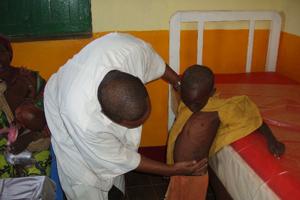
A boy receives treatment for Kala-azar in the Caritas centre
Credits: Caritas Somalia
by David Omwoyo
Seated outside the Caritas health centre in Baidoa, Mama Habibo Salad Habibo waits for help. After walking more than 18 km from her home with her two young children, she is glad that her sick child will finally get treatment.
Hawo Salad, her two-year-old daughter looks emaciated and sleepy. Yet her stomach is swollen, leaving the impression of a child overfed. But the wounds on her belly, visible ribs, tiny legs and hands speak otherwise.
“It was her father,” Habibo says pointing at the wounds, “he was treating her stomach problem by placing a hot iron on it. When she did not recover after four weeks, I decided to bring her to this centre.”
Caritas Nurse Abdullahi Mumin explained that it is a tradition among Somalis to treat all stomach ailments by placing a hot iron or smouldering embers on the belly. He himself has scars on his stomach inflicted when he suffered a bout of diarrhoea as a child and his father administered the same treatment.
.
Hawo is suffering from Kala-azar (Leishmaniasis) a parasitic illness contracted after being bitten by a sand fly. Kala-azar symptoms include fever, enlarged spleen, headaches, muscle loss and a protruding stomach. It is a common disease in Somalia. Kala-azar affects mostly children and young people. For years it has been affecting people, leaving many dead as often only traditional medication is available. The hot metal treatment is also used in the case of malaria and any illness with a high fever and stomach upsets.
“We are torn between treating the wounds, administering food supplements to the seriously emaciated, and treating the real cause,” said Nurse Abdullahi.
It is a complicated matter in a region where basic infrastructures and security are lacking. The patient is supposed to get a daily injection for 30 days, but the Caritas centre is an outpatient facility and some of the patients have travelled 75 km.
Working with technical support from Caritas United States of America (Catholic Relief Services/CRS) and Merlin, the Caritas Somalia health centre has been able to offer specialized treatment to many people.
“Providing food besides treatment to these patients has been a good decision. Since they normally come from far-away villages, to enable the young patients accompanied by one of the parents or a close relative, to be welcomed by a local family, we secure a fixed amount of rice, beans, oil, sugar and tea leaves.” said Davide Bernocchi, Caritas Somalia’s director.
Little Amino was one such case. When she was brought into the medical centre, the nurses realized she was just too weak to be injected or given any medication. Her immediate need was high-energy food, then first aid for the wounds, before administrating an injection for Kala-azar.
The seven-year-old girl can hardly walk, she talks inaudibly and her pain does not leave her enough energy to even cry. That she walked 35 km to the medical centre is hard to imagine.
“She had to walk because I was carrying her three-year-old sister and I am five months pregnant,” said her mother, Marian Abdi. “The only food we had for the two days was some milk we carried from home. We drank dirty water along the way.”
But she is glad that despite the hardship they had to endure her daughter will be treated.
